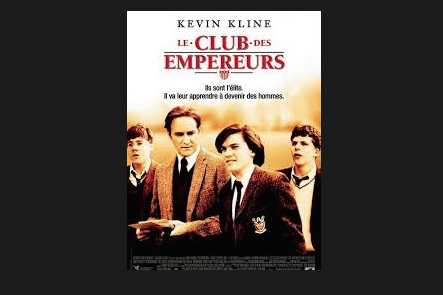The Emperor’s Club (Ethan Canin & Neil Tolkin, 2002)

Features & First Impressions
The ‘inspirational-teacher’ genre has proven attractive to Hollywood: think Goodbye Mr. Chips (1939),
As you think about this film in relation to other similar films, what stands out as being similar, and what stands out as being different? For example, how is ‘William Hundert’ different than other noble teachers we are accustomed to seeing in the movies?
Key Characters & Story Resolution
Who are the main characters in the story? What do we know about them (from the point of view of the film)? How are they introduced to us and how do we leave them?
With regard to the students of St. Benedicts, what collective and more personal struggles were depicted in this film? How effective are the portrayals of choices made in one season of life as affecting those in a later season?
Are the teachers of St. Benedicts morally flawed? If so, how are they flawed and what is different (if anything) about their handling of such struggles?
In the case of Mr. Hundert, what motivated him to raise Sedgewick Bell’s grade? Did anything different motivate him to accept Sedgewick Bell’s rematch twenty-five years later?
How did the action of the story resolve? Based upon the final act of confrontation, was justice done? Was there a lesson learned? And if so, who learned it?
James Berardinelli (San Francisco Chronicle) writes, “The Emperor’s Club doesn’t have a lot of heft. It’s a relatively lightweight story carried more by the well-defined characters than by plot developments. In the end, we get a sense that it has all been worthwhile, not only for Mr. Hundert, but for those of us sitting in the audience.” As you reflect upon the film, were you satisfied by its ending? Is there “heft” (moral or otherwise) to this story? Please explain why or why not.
Basic Theme & Points of Interaction with Christian Faith
In light of discussion, how would you summarize what this film is and is not about?
What, according to Mr. Hundert, and presumably his colleagues at St. Benedicts, is school or education really about? Do all agree? Do you agree?
What challenges the goal of education? Is it simply that not all agree? Is there also a structural flaw? I do not know if it is intentional, but it is certainly ironic that the whole matter of virtue is portrayed in relation to being “Mr. Julius Caesar.”
Is there any ‘gospel’ in this film?
What do you take away with you from your having viewed this film?
Did you know?
-Sedgewick Bell’s playing catch against the wall of his dorm room is a reference to The Great Escape.
-Kevin Kline’s character, William Hundert, is modeled after Robert Nowe, a classical history teacher at Town School for Boys in San Francisco. Nowe inspired the short story on which this film is based.
While on location at the Emma Willard School in Troy, New York, Kevin Kline stood in as an English teacher for several classes who were studying Shakespeare at the time.
-Kevin Kline attended Saint Louis Priory School in MO, a private, all-boys Benedictine high school similar to the school in the film. He drew inspiration for his performance from his experiences there, and his Priory ring can also be seen in the film.
-Ethan Canin, author of The Palace Thief (upon which the movie is based) appears as one of the board members around the table during Hundert’s meeting with the school’s board of directors. He is seated on the Headmaster’s right during the meeting.
Copyright © 2012 Mark Ryan
Source
The Emperor's Club Cast & Credits:Kevin Kline (William Hundert)
Emile Hirsch (Sedgewick Bell)
Embeth Davidtz (Elizabeth)
Rob Morrow (James Ellerby)
Edward Hermann (Headmaster Woodbridge)
Harris Yulin (Senator Bell)
Writer: Michael Hoffman
Director: Ethan Canin and Neil Tolkin
Producers: Sean Bailey, Armyan Bernstein, Thomas Bliss and others
Release: 2002, USA
Run time: 109 mins
Rated PG-13 for some sexual content

